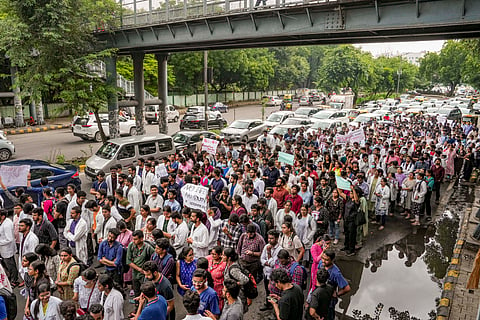

NEW DELHI: Even as doctors are demanding a central law to protect healthcare workers in the backdrop of the rape and murder of a trainee woman doctor on duty in a West Bengal government hospital, the centre in the past, both inside and outside the parliament, has denied the need for separate legislation prohibiting violence against the doctors and healthcare professionals.
The draft bill for the protection of healthcare workers and hospitals has been pending with the government for the past five years. According to RTI activist, Dr K. V. Babu, who had filed an RTI in this regard, said that the central government has clarified both in the parliament and outside that they are not pursuing the draft legislation.
The draft of the Healthcare Services Personnel and Clinical Establishments (Prohibition of Violence and Damage to Property) Bill, 2019 was prepared and was also circulated for consultations.
However, the former Union Health Minister Mansukh Mandaviya in a written reply in the Rajya Sabha last year in February had said, “It was decided not to enact a separate legislation for prohibiting violence against doctors and other health care professionals.”
He had said that the matter was further discussed with relevant ministries and departments of government as well as all stakeholders, and an ordinance namely The Epidemic Diseases (Amendment) Ordinance, 2020 was promulgated on April 22, 2020.
The demand for a central act has once again been raised by resident doctors, who have stopped work, demanding justice for the trainee woman doctor. As the protests have intensified throughout the country, a delegation of the Indian Medical Association (IMA), which has over 3.5 lakh senior doctors as members, met Union Health Minister J P Nadda on Tuesday.
High on their wish list was enacting the central law, which was once on the agenda of the central government but is now on the back burner.
Speaking to this paper, Dr. R.V. Asokan, National President of the Indian Medical Association (IMA), said they have raised the issue of the central law for the protection of healthcare professionals with Nadda.
"He has told us that he will study the issue and will come back to us.”
Agreeing that the matter of a central law has been pending for the past five years, Asokan, said, “One has to be patient and has to keep the pressure up.”
He said they have also appraised Nadda about the fact that women doctors now outnumber male doctors. “Now, 60-70 per cent of doctors are women. They are taking over from men. Their security is of utmost importance,” he said.
Speaking about the central law, Kerala-based Dr Babu, said, “As per the RTI reply, I received in September 2022 from the Union Health Ministry, they clarified that the government is not keen on pursuing the draft legislation.”
”It is very disappointing that the government is still not enacting a central law, which is very much needed now as it mandates security for hospitals and healthcare workers. In view of the West Bengal incident and the indefinite strike by resident doctors, I hope the government listens and enacts the central law,” Babu said.
It is to be noted that Nadda informed the Lok Sabha last month that the newly enacted Bharatiya Nyaya Sanhita (BNS) and the Bharatiya Nagrik Suraksha Sanhita (BNSS) have adequate provisions to protect medical professionals against violence. He was responding to a question from Congress MP Shashi Tharoor about whether the government proposes to introduce any legislation to curb the rising trend of violence against medical professionals in the country.
During the COVID-19 pandemic, the centre passed the Epidemic Diseases (Amendment) Act, 2020 under which acts of violence against healthcare personnel during any situation were considered cognizable and non-bailable offences.
Under the Epidemic Diseases (Amendment) Act, the commission or abetment of acts of violence or damage or loss to any property is punishable with imprisonment for a term of three months to five years, and with a fine of Rs 50,000 to Rs 2,00,000. It was passed on September 28, 2020.
In case of causing grievous hurt, imprisonment shall be for a term of six months to seven years and with a fine of Rs 1,00,000 to Rs 5,00,000.
In addition, the offender shall also be liable to pay compensation to the victim and twice the fair market value for property damage.